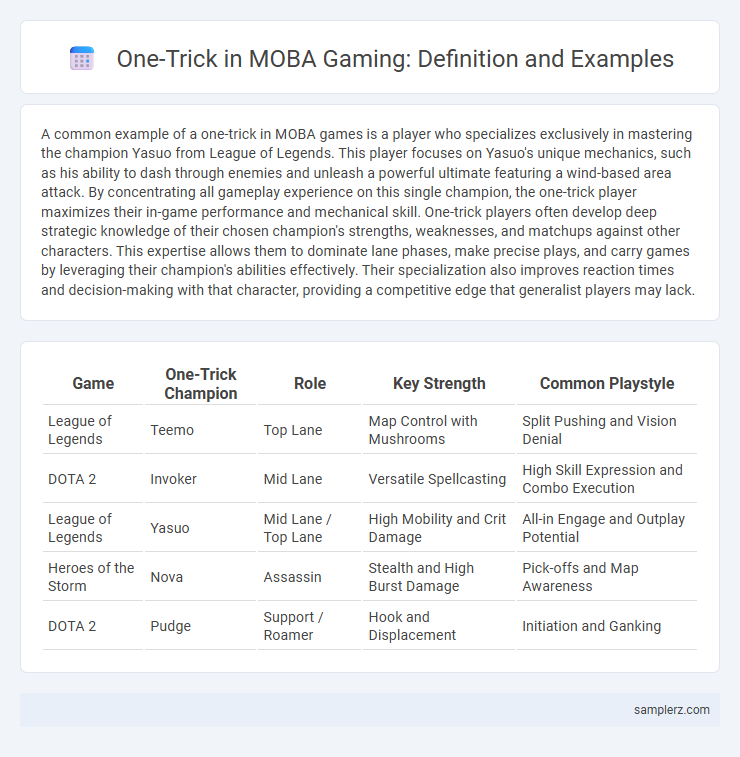A common example of a one-trick in MOBA games is a player who specializes exclusively in mastering the champion Yasuo from League of Legends. This player focuses on Yasuo's unique mechanics, such as his ability to dash through enemies and unleash a powerful ultimate featuring a wind-based area attack. By concentrating all gameplay experience on this single champion, the one-trick player maximizes their in-game performance and mechanical skill. One-trick players often develop deep strategic knowledge of their chosen champion's strengths, weaknesses, and matchups against other characters. This expertise allows them to dominate lane phases, make precise plays, and carry games by leveraging their champion's abilities effectively. Their specialization also improves reaction times and decision-making with that character, providing a competitive edge that generalist players may lack.
Table of Comparison
| Game | One-Trick Champion | Role | Key Strength | Common Playstyle |
|---|---|---|---|---|
| League of Legends | Teemo | Top Lane | Map Control with Mushrooms | Split Pushing and Vision Denial |
| DOTA 2 | Invoker | Mid Lane | Versatile Spellcasting | High Skill Expression and Combo Execution |
| League of Legends | Yasuo | Mid Lane / Top Lane | High Mobility and Crit Damage | All-in Engage and Outplay Potential |
| Heroes of the Storm | Nova | Assassin | Stealth and High Burst Damage | Pick-offs and Map Awareness |
| DOTA 2 | Pudge | Support / Roamer | Hook and Displacement | Initiation and Ganking |
Understanding One-Tricking in MOBA Games
One-tricking in MOBA games involves specializing extensively in a single hero or champion to master their abilities, mechanics, and optimal strategies. This focused expertise allows players to maximize impact in matches, leveraging deep knowledge of their chosen character's strengths and weaknesses. However, one-tricking may limit adaptability against diverse team compositions or meta shifts within competitive play.
Popular One-Trick Champions Across Titles
Popular one-trick champions in MOBAs include Lee Sin in League of Legends, known for his high mobility and playmaking potential, and Riki in Dota 2, favored for his stealth and burst damage. In mobile MOBAs like Mobile Legends, heroes like Lancelot are commonly one-tricked for their quick burst combos and high damage output. These champions offer a focused skill set that allows players to optimize mechanics and game knowledge for competitive success.
Benefits of Being a One-Trick Player
Mastering a single champion in a MOBA enhances strategic depth and mechanical precision, allowing players to anticipate matchups and optimize item builds effectively. Specialization reduces reaction time and improves decision-making under pressure, giving a competitive edge during critical moments. This focused expertise often leads to higher win rates and faster climbing through ranked tiers, showcasing the tangible benefits of being a one-trick player.
Challenges Faced by One-Trick Mains
One-trick mains in MOBA games often encounter significant challenges such as limited champion versatility, which makes team composition restrictions a frequent problem during champion select. They may also struggle against meta shifts where their chosen character becomes less viable due to balancing updates or emerging strategies. Furthermore, their learning curve in mastering matchups and situational plays with a single champion demands consistent adaptation and in-depth knowledge to maintain competitive performance.
Famous One-Tricks in the MOBA Community
Famous one-tricks in the MOBA community include players like Faker, renowned for his mastery of LeBlanc in League of Legends, and Dendi, celebrated for his signature Pudge in Dota 2. These players focus exclusively on one hero to optimize mechanics, map awareness, and in-game strategy, often dominating their roles and climbing leaderboards. Their dedication to a single character exemplifies the high-level specialization and skill ceiling within competitive MOBAs.
How One-Tricking Impacts Team Composition
One-tricking a champion in MOBA games can significantly disrupt team composition by limiting flexibility in roles and strategic options. When a player specializes exclusively in one character, it often leads to predictable gameplay, restricting counter-picks and synergy with other team members. This rigidity can result in imbalanced team dynamics and reduced adaptability during critical match moments.
Adapting Strategies as a One-Trick
Mastering a single champion as a one-trick in MOBA games requires constant adaptation to counter diverse team compositions and opponent tactics. By analyzing matchups and adjusting build paths or playstyles, one-tricks can maintain effectiveness despite being limited to a single hero. Flexibility in itemization and map awareness ensures they stay competitive and impactful in every game scenario.
Countering One-Trick Champions in Ranked Play
Mastering counter-picks against one-trick champions in MOBA ranked play significantly improves win rates by exploiting their limited champion pool. Selecting versatile champions with crowd control and mobility, such as Lee Sin or Lissandra, can effectively disrupt one-trick players' rhythm and force mistakes. Understanding the specific mechanics and common strategies of champions like Riven or Zed allows for strategic drafting and in-game adjustments that neutralize their impact.
Success Stories: Climbers Who One-Tricked to the Top
One-trick players like Faker, renowned for his exceptional mastery of Zed in League of Legends, demonstrate how specializing in a single champion can lead to top-tier success and global recognition. These climbers leverage deep mechanical skills and situational knowledge, allowing them to outperform multi-role players in ranked ladders. Their dedication to one-tricking transforms niche expertise into consistent victories and high Elo placements.
Transitioning from One-Trick to Versatile Player
Mastering a single champion as a one-trick in MOBA games like League of Legends hones deep strategic knowledge and mechanical skills, but transitioning to a versatile player requires expanding the champion pool to adapt to diverse team compositions and counter picks. Developing proficiency across multiple roles, such as mid lane, jungle, or support, enhances map control awareness and decision-making, crucial for climbing ranked ladders. Embracing flexibility not only improves synergy with teammates but also mitigates the risk of being banned or countered, significantly boosting overall win rates and in-game impact.

example of one-trick in MOBA Infographic
 samplerz.com
samplerz.com